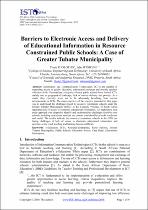 ResearchSpace
ResearchSpace
Barriers to electronic access and delivery of educational information in resource constrained public schools: a case of Greater Tubatse Municipality
JavaScript is disabled for your browser. Some features of this site may not work without it.
- ResearchSpace
- →
- Research Publications/Outputs
- →
- Conference Publications
- →
- View Item
| dc.contributor.author |
Pholotho, T

|
|
| dc.contributor.author |
Mtsweni, Jabu S

|
|
| dc.date.accessioned | 2017-07-28T09:02:21Z | |
| dc.date.available | 2017-07-28T09:02:21Z | |
| dc.date.issued | 2016-05 | |
| dc.identifier.citation | Pholotho, T. and Mtsweni, J.S. 2016. Barriers to electronic access and delivery of educational information in resource constrained public schools: a case of Greater Tubatse Municipality. IST-Africa 2016 Conference Proceedings, 13-14 May 2016, Durban, South Africa. DOI: 10.1109/ISTAFRICA.2016.7530626 | en_US |
| dc.identifier.isbn | 978-1-905824-55-7 | |
| dc.identifier.uri | DOI: 10.1109/ISTAFRICA.2016.7530626 | |
| dc.identifier.uri | http://ieeexplore.ieee.org/document/7530626/ | |
| dc.identifier.uri | http://hdl.handle.net/10204/9340 | |
| dc.description | IST-Africa 2016 Conference Proceedings, 13-14 May 2016, Durban, South Africa | en_US |
| dc.description.abstract | Information and Communication Technologies (ICTs) are capable of expanding access to quality education, educational resources and provide teachers with new skills. Nevertheless, a majority of rural public schools have limited ICTs, mainly due to geographical landscape, lack of service delivery and poverty. As a result, they currently seem not to be adequately benefiting from current advancements in ICTs. The main objective of the research presented in this paper was to understand the challenges faced by resource constrained schools under the Greater Tubatse Municipality (GTM) in the Limpopo Province of South Africa regarding lack of access to electronic educational information. An exploratory case study approach was adopted to identify and understand the challenges faced by rural schools, including educational services and content considered by schools as relevant and useful. The results indicate that resource-constrained schools in the GTM are facing challenges of lack of access to electronic educational information and services, as the result teaching and learning becomes difficult. | en_US |
| dc.language.iso | en | en_US |
| dc.publisher | IEEE | en_US |
| dc.relation.ispartofseries | Worklist;18155 | |
| dc.subject | Greater Tubatse Municipality | en_US |
| dc.subject | Electronic access | en_US |
| dc.subject | Educational information delivery | en_US |
| dc.subject | e-Education | en_US |
| dc.subject | Resource-constrained | en_US |
| dc.subject | Rural schools | en_US |
| dc.subject | Public schools | en_US |
| dc.subject | Electronic access | en_US |
| dc.title | Barriers to electronic access and delivery of educational information in resource constrained public schools: a case of Greater Tubatse Municipality | en_US |
| dc.type | Conference Presentation | en_US |
| dc.identifier.apacitation | Pholotho, T., & Mtsweni, J. S. (2016). Barriers to electronic access and delivery of educational information in resource constrained public schools: a case of Greater Tubatse Municipality. IEEE. http://hdl.handle.net/10204/9340 | en_ZA |
| dc.identifier.chicagocitation | Pholotho, T, and Jabu S Mtsweni. "Barriers to electronic access and delivery of educational information in resource constrained public schools: a case of Greater Tubatse Municipality." (2016): http://hdl.handle.net/10204/9340 | en_ZA |
| dc.identifier.vancouvercitation | Pholotho T, Mtsweni JS, Barriers to electronic access and delivery of educational information in resource constrained public schools: a case of Greater Tubatse Municipality; IEEE; 2016. http://hdl.handle.net/10204/9340 . | en_ZA |
| dc.identifier.ris | TY - Conference Presentation AU - Pholotho, T AU - Mtsweni, Jabu S AB - Information and Communication Technologies (ICTs) are capable of expanding access to quality education, educational resources and provide teachers with new skills. Nevertheless, a majority of rural public schools have limited ICTs, mainly due to geographical landscape, lack of service delivery and poverty. As a result, they currently seem not to be adequately benefiting from current advancements in ICTs. The main objective of the research presented in this paper was to understand the challenges faced by resource constrained schools under the Greater Tubatse Municipality (GTM) in the Limpopo Province of South Africa regarding lack of access to electronic educational information. An exploratory case study approach was adopted to identify and understand the challenges faced by rural schools, including educational services and content considered by schools as relevant and useful. The results indicate that resource-constrained schools in the GTM are facing challenges of lack of access to electronic educational information and services, as the result teaching and learning becomes difficult. DA - 2016-05 DB - ResearchSpace DP - CSIR KW - Greater Tubatse Municipality KW - Electronic access KW - Educational information delivery KW - e-Education KW - Resource-constrained KW - Rural schools KW - Public schools KW - Electronic access LK - https://researchspace.csir.co.za PY - 2016 SM - 978-1-905824-55-7 T1 - Barriers to electronic access and delivery of educational information in resource constrained public schools: a case of Greater Tubatse Municipality TI - Barriers to electronic access and delivery of educational information in resource constrained public schools: a case of Greater Tubatse Municipality UR - http://hdl.handle.net/10204/9340 ER - | en_ZA |





